The decision to get a divorce is a very difficult one no matter where you live or what the circumstances.
But while some may think the decision itself is the hardest part of the divorce process, the choice of using divorce mediation vs divorce lawyer can be an even more challenging one if you don't know the differences between the two.
With a little education, you can make the decision that's right for you in your situation.
Mediation vs Lawyers for Divorce
Before we cover some of the differences between using a divorce mediator vs attorney, here’s a high-level overview of how each of these divorce options work:
What is a Lawyer’s Role?
A lawyer’s role is to advocate for the one party that hired them with the goal of achieving the most favorable outcome for their one client. A lawyer can only represent one party.
Traditional Divorce Litigation:
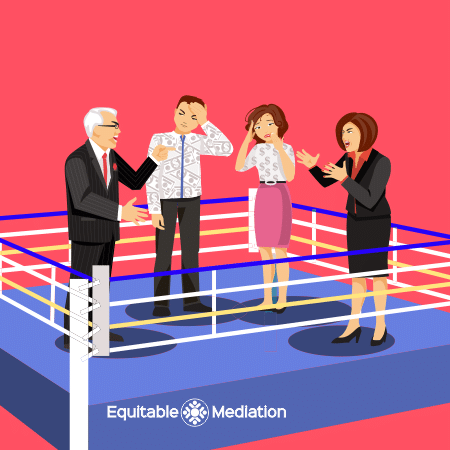 There are many steps involved in a litigated divorce with lawyers and the steps vary from state-to-state, county-to county and couple-to-couple.
There are many steps involved in a litigated divorce with lawyers and the steps vary from state-to-state, county-to county and couple-to-couple.
But at a very high level, in a standard lawyer divorce, each divorcing spouse hires their own lawyer to identify, negotiate and attempt to resolve the issues required to end their marriage.
The two lawyers will enter into negotiations on behalf of their clients regarding the issues.
If agreement cannot be reached on one or more of the issues using this approach, the divorce will carry on through the family court system.
.webp?width=450&name=divorce-litigation-is-destructive%20(1).webp) A court date will be set. And each divorce attorney along with the party that hired them will prepare their case.
A court date will be set. And each divorce attorney along with the party that hired them will prepare their case.
Documents will be presented to the court throughout the divorce trial. Arguments will be made regarding the merits of positions.
Witnesses or outside experts will be brought in to court to testify. The couple’s children may even be called to the stand during litigation.
All of this transpires in court in front of a family law judge who will ultimately decide the outcome regarding parenting time, child custody, child support, alimony and division of marital assets and debts.
Divorce Mediation Process:
This is a dynamic alternative dispute resolution process.
What is a Mediator and What is the Mediator’s Role?
 A mediator is an independent, neutral third-party who conducts mediation proceedings.
A mediator is an independent, neutral third-party who conducts mediation proceedings.
He or she helps people involved in a conflict or dispute come to agreement.
For divorcing parties, the divorce itself is the dispute and the mediator’s role is to help both parties (spouses) identify, negotiate and come to mutually-acceptable agreement on the various issues and financial matters required to end their marriage out of court.
In a mediation session, the divorce mediator actively participates in the negotiations, but the spouses have full control over the divorce agreement and decisions they will be making, which is unlike arbitration whereby an arbitrator acts as a judge and controls the decision-making process.
Is a Mediator a Lawyer?
Mediation is a skillset unto itself and is also an unregulated field. So a mediator can be a family law attorney or non-attorney (financial professional, mental health professional, etc.).
It is common for a divorce attorney or retired judge to feel that attending law school provides them the skills they need in order to practice mediation, so you will find that there are a number of mediating attorneys out there.
But while they may have a grasp of divorce law, they may or may not know how to be an effective, neutral mediator.
Lawyers also may not have the financial acumen required to resolve the many complex fiscal matters surrounding divorce.
The best mediators have been professionally trained in mediation, are fully neutral, know the divorce issues, and are also experts in resolving the complex financial matters surrounding the divorce.
There is no requirement that a mediator be a lawyer and in fact, some of the most qualified mediators aren't lawyers at all.
Additionally, when a couple uses divorce mediation, lawyers are not also required at any point in their uncontested divorce unless either/both spouses choose to involve them. That makes mediating a good option for those who wish to divorce without lawyers, without court and without litigation.
Learn more about divorce through mediation
Collaborative Divorce / Collaborative Law Process
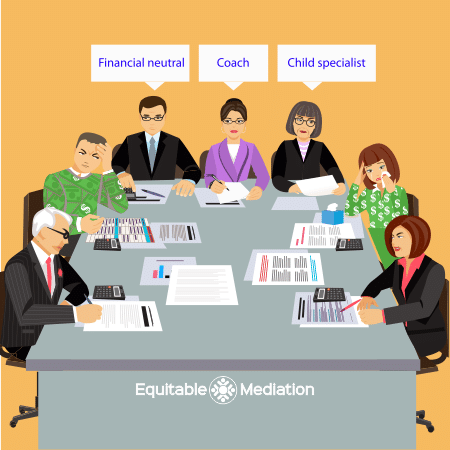 The Collaborative Law Process (also referred to as collaborative divorce, collaborative process or collaborative divorce process) is a cross between lawyer-driven divorce litigation and divorce mediation.
The Collaborative Law Process (also referred to as collaborative divorce, collaborative process or collaborative divorce process) is a cross between lawyer-driven divorce litigation and divorce mediation.
To learn more about the differences between these two divorce methods, read: Collaborative Divorce Process vs Mediation Process.
To learn more about how each of these three divorce options work, read: The 5 Divorce Options and How to Choose the Right One for You.
Some of the differences between using a divorce mediator vs attorney:
Number of Professionals
- In divorce mediation, there is 1 mediator vs. 2 lawyers for divorce.
Premise
- A lawyer can only represent one party and their job is to advocate for their one client.
- A mediator is a neutral third party and doesn’t take sides – in divorce mediation, they help both spouses reach an agreement best for them and their children.
Approach
- Lawyers give legal advice and advise their clients on what to do.
- Mediators do not dispense legal advice. Instead, they empower a divorcing couple to make their own decisions and agreement.
Time to Completion
- A lawyer-driven divorce can take 18 months to 3 years to complete.
- A mediated divorce can take 2 to 6 months to complete (2 to 4 mediation sessions) and the speed of the process is in large part directed by the spouses.
Cost
- A standard lawyer-driven divorce can range from $20,000 to $32,000. If a case goes to trial in court, litigation can range from $78,000 to $200,000.
- The total cost of a mediated divorce can range from $6,000 to $10,000.
Certainty of Outcome
A lawyer-driven litigated divorce is risky because there are no guarantees as to which side of any issue a judge is going to rule in court.
Some lawyers use strategies to confuse, manipulate or outsmart their opposition. Every lawyer has their own style and personality. Some family law attorneys can be hostile and deceptive; others can be irrational. So if you hire a divorce lawyer who is unreasonable or incompetent, you could find yourself with an unfavorable case outcome.
And if your case goes to trial and the judge makes their decision, you could find that you're not satisfied with the ruling in your divorce matter.
- In private mediation, since both spouses have a direct say in outlining the terms of their agreement, dispute resolution outcomes are certain with respect to the couple's parenting plan arrangement, child custody and child support, spousal support, property division and all other issues that must be resolved in their no-fault divorce.
Peaceful
- The divorce mediation process is non-adversarial and cooperative so it's more peaceful working with a mediator vs lawyer divorce.
- A lawyer-driven divorce, especially litigation, is an adversarial process and not peaceful in any way.
Confidentiality
- A divorce litigation is a matter of public record.
- Using a mediator for divorce is private and confidential.
Divorce Mediation vs Lawyer: Which Should You Choose?
Listed below are some good reasons to choose mediation vs lawyers for divorce.
Use Divorce Mediation vs Attorney When:
1. You want what's best for your children.
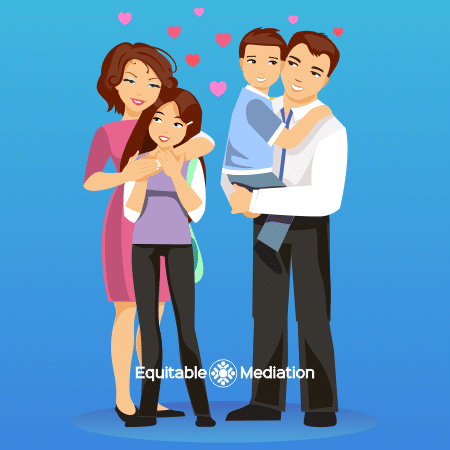 Far and away, this is first on the list of the many benefits of divorce mediation. As a parent, you already know that divorce is tough on you.
Far and away, this is first on the list of the many benefits of divorce mediation. As a parent, you already know that divorce is tough on you.
But it's even tougher on your kids.
So by discussing the issues as parents, instead of litigants, you can outline the terms of your settlement agreement including time sharing and child support so that they are focused on what's truly best for your children.
2. You want to keep things peaceful.
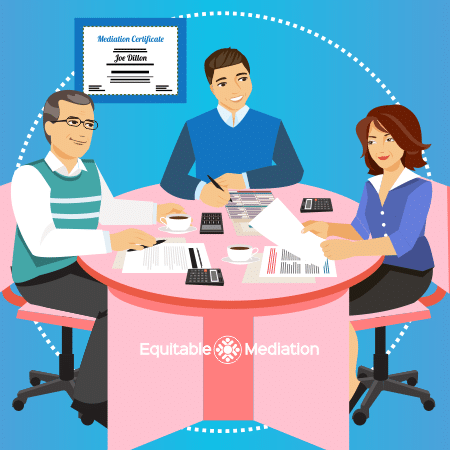 Even happily married couples argue occasionally, so it's no surprise that divorcing spouses fight.
Even happily married couples argue occasionally, so it's no surprise that divorcing spouses fight.
But you don't need to agree on everything or be the best of friends in order to mediate.
If you and your soon-to-be ex are both willing to mediate, you can have a successful family mediation.
And you can more peacefully divorce.
3. You want to save money.
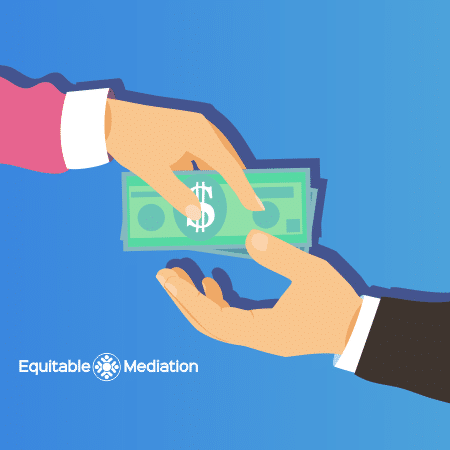 Retainers range from $5,000 to $10,000 per person.
Retainers range from $5,000 to $10,000 per person.
So if you work with lawyers, right off the bat you're looking at spending a minimum of $10,000 to $20,000 for your divorce case.
And everyone knows that's just the beginning. The cost of divorce only goes up from there, especially if there's disagreement on any of the issues.
But if you use mediation, you can save thousands on your divorce.
4. You don't want your divorce proceedings to drag on forever.
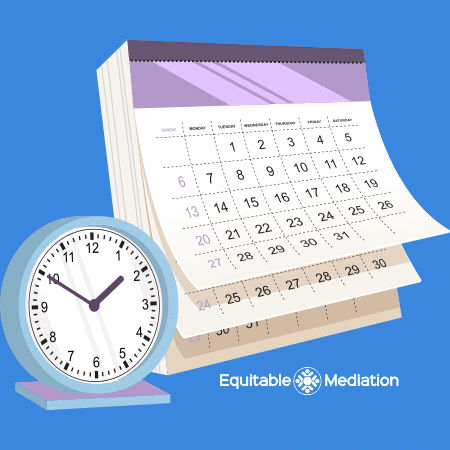 When you look at the choice of a divorce mediator vs attorney, mediated divorces take significantly less time.
When you look at the choice of a divorce mediator vs attorney, mediated divorces take significantly less time.
Divorces that are handled by attorneys take longer, in part, because of the back and forth nature of communications that happen between opposing counsel.
Instead of waiting to talk to your lawyer about a topic of disagreement and then waiting for your lawyer to write a letter to the other side and then waiting for a response, in mediation, all communications take place in real time so any disagreements can be discussed and resolved right then and there.
If you want to complete your divorce in a lot less time, mediation is the way to go.
5. You want a high level of control over your divorce agreement.
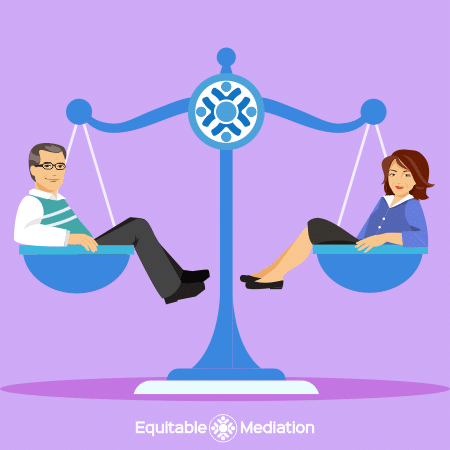 Mediation allows you and your husband or wife to discuss and resolve all issues that pertain to your particular situation. And your agreement can also be customized to your specific needs.
Mediation allows you and your husband or wife to discuss and resolve all issues that pertain to your particular situation. And your agreement can also be customized to your specific needs.
The two of you will be fully empowered to make educated decisions that are right for you. And your divorce settlement will be fair to both of you because you'll both have direct input into crafting its terms and conditions.
When Should I Get a Lawyer?
Use a Lawyer vs Mediator When:
1. Your spouse is incapacitated.
Mediation is all about "self-determination" and the parties' abilities to make decisions that are in their own best self-interests.
But what if you have doubts about your spouse's ability to do that?
Perhaps they're an addict or are living with a neurological condition such as Alzheimer's disease. Or for some other reason, they do not have the ability to make sound decisions.
If they're mentally incapacitated in any way, they'll need an advocate and should get a family law attorney.
2. You fear for your safety or there's domestic violence.
If there's a restraining order in effect, it may make mediating impossible.
Or maybe there's such a significant power imbalance that you are afraid to express your true needs for fear of retribution from the other side.
Your safety should be your number one concern, so if you are afraid for your safety, you'll want to get an attorney instead of using mediation.
3. You have reason to believe your spouse is hiding assets.
Mediation is a good faith negotiation and requires transparency.
So if you have evidence that your husband or wife is hiding assets or debts from you, or their business dealings aren't above bar, choose a lawyer vs a mediator.
Lawyers can file motions with the courts to compel your spouse to surrender the necessary documentation needed to see if, in fact, there is an issue.
4. Your spouse is unwilling to mediate.
Because mediation is a voluntary process, both of you must be willing to at least give it a try. Active participation by both spouses is one of the requirements to make mediation work.
If you want to mediate but your spouse refuses to cooperate, you'll need to find another divorce method.
Divorce Mediator vs Attorney for Divorce?
 So as you can see, the question of whether to use a lawyer vs mediator is one that solely depends on your unique situation.
So as you can see, the question of whether to use a lawyer vs mediator is one that solely depends on your unique situation.
But if you want to divorce amicably and do what's best for your children while saving money and time in the process, and your spouse is willing to do the same, get a mediator vs divorce lawyer.
You'll be glad you did!
Don't Let Your Divorce Become a Disaster!
Divorce Through Mediation Instead.

If you and your spouse live in New Jersey, Illinois, Pennsylvania, New York, California, Washington State, or Michigan, learn more about the benefits of working with us.
Then, when you are ready to start the divorce process, take the next step and book a mediation strategy session for the two of you!
Book a Strategy Session
Early in the divorce process?
The choices you make before you start your divorce are critical.

Regardless of how many years you've been married, whether you're the one who wants the divorce, your spouse does or you're both on the same page, the choices you make before you start your divorce will likely set the tone for how the entire process will unfold for you and your children.
And how peaceful, fair, child-focused and cost-effective your divorce will (or won't) be.
But you can only make smart choices if you take the time to get educated and prepare for divorce first.
People who prepare do better in divorce!
Learn More
Other Useful Resources:
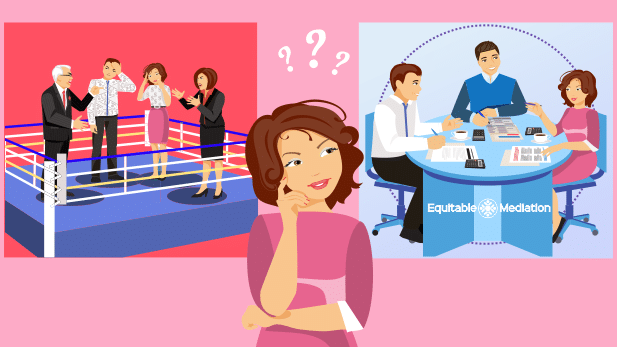


 There are many steps involved in a litigated divorce with lawyers and the steps vary from state-to-state, county-to county and couple-to-couple.
There are many steps involved in a litigated divorce with lawyers and the steps vary from state-to-state, county-to county and couple-to-couple..webp?width=450&name=divorce-litigation-is-destructive%20(1).webp) A court date will be set. And each divorce attorney along with the party that hired them will prepare their case.
A court date will be set. And each divorce attorney along with the party that hired them will prepare their case. A mediator is an independent, neutral third-party who conducts mediation proceedings.
A mediator is an independent, neutral third-party who conducts mediation proceedings. The Collaborative Law Process (also referred to as collaborative divorce, collaborative process or collaborative divorce process) is a cross between lawyer-driven divorce litigation and divorce mediation.
The Collaborative Law Process (also referred to as collaborative divorce, collaborative process or collaborative divorce process) is a cross between lawyer-driven divorce litigation and divorce mediation. Far and away, this is first on the list of the many
Far and away, this is first on the list of the many  Even happily married couples argue occasionally, so it's no surprise that divorcing spouses fight.
Even happily married couples argue occasionally, so it's no surprise that divorcing spouses fight. Retainers range from $5,000 to $10,000 per person.
Retainers range from $5,000 to $10,000 per person. When you look at the choice of a divorce mediator vs attorney, mediated divorces take significantly less time.
When you look at the choice of a divorce mediator vs attorney, mediated divorces take significantly less time. Mediation allows you and your husband or wife to discuss and resolve all issues that pertain to your particular situation. And your agreement can also be customized to your specific needs.
Mediation allows you and your husband or wife to discuss and resolve all issues that pertain to your particular situation. And your agreement can also be customized to your specific needs. So as you can see, the question of whether to use a lawyer vs mediator is one that solely depends on your unique situation.
So as you can see, the question of whether to use a lawyer vs mediator is one that solely depends on your unique situation.

